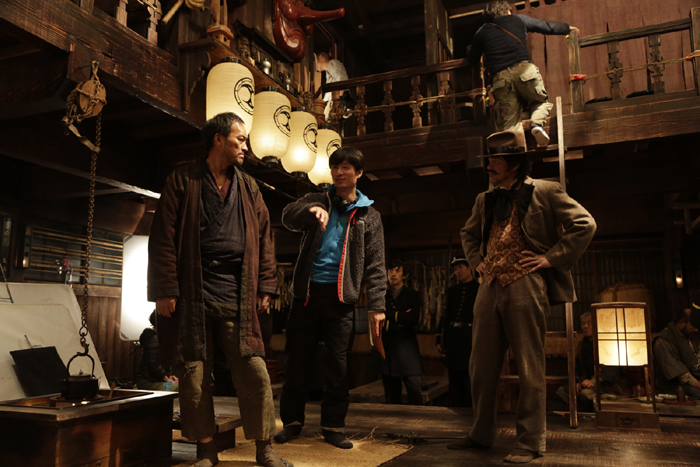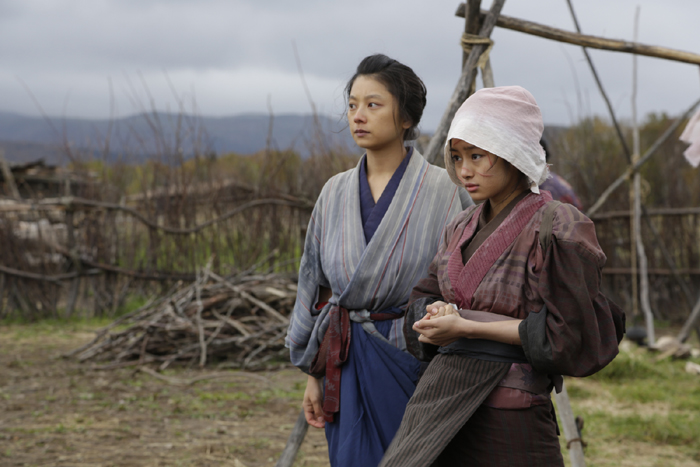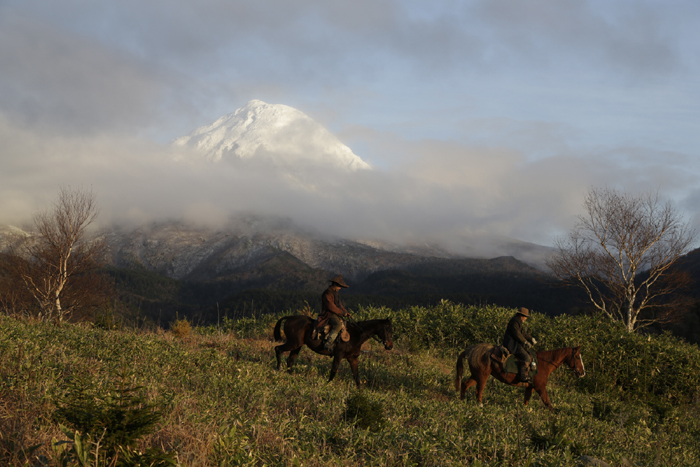Source: Warner Bros. Pictures Japan, Venice International Film Festival Official Site: yurusarezaru.com (Japan)
 English promotional art for YURUSAREZARUMONO. Image courtesy of Warner Bros. Pictures Japan. © 2013 Warner Entertainment Japan Inc.
English promotional art for YURUSAREZARUMONO. Image courtesy of Warner Bros. Pictures Japan. © 2013 Warner Entertainment Japan Inc.There is strength, and there is also weakness. There is the beauty and the ugliness of mankind. And in the end, there is the final prayer of a beating heart... In 1964 Clint Eastwood starred in the acclaimed spaghetti western A FISTFUL OF DOLLARS (Per un Pugno di Dollar), a remake of Akira Kurosawa`s samurai classic YOJIMBO (???, Yoojinboo, 1961). A half century later, the tables have turned as Eastwood`s Oscar winning western UNFORGIVEN (1992) has been remade -- with Eastwood`s blessing -- in Japan as YURUSAREZARUMONO (??????, 2013). Directed by Lee Sang-il (HULA GIRLS, VILLAIN) and starring Ken Watanabe (THE LAST SAMURAI, INCEPTION, GODZILLA) in the Eastwood role, YURUSAREZARUMONO will open in Japanese cinemas this Friday, September 13. That same day, the film will have its North American premiere at the Toronto International Film Festival. The following press notes and photos are courtesy of Warner Bros. Pictures Japan... INTRODUCTION For the first time in Japanese cinematic history, an American Academy Award remake is coming to life. Released worldwide in 1992, UNFORGIVEN, starring and directed by Clint Eastwood, was hailed by critics as a cinematic masterpiece. It was nominated for nine Oscars and brought home four, including Best Picture and Best Director. Inspired by the film, Korean-Japanese filmmaker Lee Sang-il presents YURUSAREZARUMONO, a story set in Japan during the same period as the original film, with globally renowned Japanese actor Ken Watanabe in the lead role.
SYNOPSIS The story takes place at the dawn of the Meiji Era in 1880, set in Ezo (now Hokkaido), the northernmost island of Japan. The Tokugawa Shogunate has just collapsed, and the Ainu aborigines strive to settle the land alongside the newly established government.
 Ken Watanabe stars as Jubei Kamata. Photo courtesy of Warner Bros. Pictures Japan. © 2013 Warner Entertainment Japan Inc.
Ken Watanabe stars as Jubei Kamata. Photo courtesy of Warner Bros. Pictures Japan. © 2013 Warner Entertainment Japan Inc.The main character, Jubei Kamata, is a relic of the Tokugawa Shogunate. During the Shogunate, his name alone terrorized Kyoto as he slew countless loyalists in the name of the Shogun. After the fall of the Shogunate, he fought in a series of battles, then vanished from sight following the fierce War of Goryokaku. Despite a relentless manhunt by the new government, Jubei disappeared into thin air. More than ten years have passed. Jubei has fathered children with an Ainu woman and lives in a secluded hamlet, barely eking out a living. Hos wife succeeded in transforming him from a man who kills, but she dies, leaving him to a quiet life raising his children and tending her grave. However, poverty leads Jubei to abandon his resolve to bury his sword. Once again, he finds himself ensnared in a life of violence. With his former comrade-in-arms, he confronts hypocrites who profess to represent justice. Again, in this new era, a vicious circle of violence begins. men at the mercy of a turbulent age are pitted against each other in the grandeur of Hokkaido`s natural setting. The fighting and horseback scenes are on a scale that rival those of American westerns.
 Bounty hunters Goro Sawada (Yuya Yagira), Kingo Baba (Akira Emoto) and Jubei. Photo courtesy of Warner Bros. Pictures Japan. © 2013 Warner Entertainment Japan Inc.
Bounty hunters Goro Sawada (Yuya Yagira), Kingo Baba (Akira Emoto) and Jubei. Photo courtesy of Warner Bros. Pictures Japan. © 2013 Warner Entertainment Japan Inc.CHARACTERS Jubei Kamata (Ken Watanabe) Formerly feared as the notorious "Jubei the Killer", he meets an Ainu woman soon after the fall of the Tokugawa Shogunate and gives up his life of violence. However, a cruel twist of fate forces Jubei to take up the sword once again after reuniting with an old friend. Ichizo Oishi (Koichi Sato) Assigned by the new government, Ichizo is the first mayor and chief of police of the town. He has no qualms about ruling the town with an iron fist. Kingo Baba (Akira Emoto) A former samurai who knows of Jubei`s past, and who fought together at the Battle of Goryokaku against the patriots of the restoration. He invites Jubei to join him in bounty hunting and earn quick money, and is Jubei`s sole confidante.
 Director Lee Sang-il (center) discusses a scene with actors Ken Watanabe and Koichi Sato. Photo courtesy of Warner Bros. Pictures Japan. © 2013 Warner Entertainment Japan Inc.
Director Lee Sang-il (center) discusses a scene with actors Ken Watanabe and Koichi Sato. Photo courtesy of Warner Bros. Pictures Japan. © 2013 Warner Entertainment Japan Inc.DIRECTOR: LEE SANG-IL Film director and screenplay writer, best known for HULA GIRLS and VILLAIN. HULA GIRLS was nominated in ten categories at the 30th Japan Academy Prize and was a winner in four categories: Best Picture, Best Director, Best Screenplay and Best Supporting Actress. VILLAIN was nominated in thirteen categories at the 34th Japan Academy Prize and was a winner in five categories: Best Actor, Best Actress, Best Supporting Actor, Best Supporting Actress and Best Music. VILLAIN also won an award for Best Actress at the 2010 Montreal International Film Festival. Filmography CHONG (???????, Ao ?Chon?, 2001) BORDER LINE (2002) 69 SIXTY NINE (?????????, Shikusuti Nain, 2004) SCRAP HEAVEN (?????????, Sukurappu Hebun, 2005) HULA GIRLS (?????, Hula Garu, 2006) THE SHORT FILMS: WE WERE ALL ONCE CHILDREN (??????????????, Min`na, Hajime wa Kodomodatta, 2008) VILLAIN (??, Akunin, 2010)
 Okaji (Eiko Koike) and Natsume (Shiori Kutsuna) seek vengeance on the men who assaulted Natsume. Photo courtesy of Warner Bros. Pictures Japan. © 2013 Warner Entertainment Japan Inc.
Okaji (Eiko Koike) and Natsume (Shiori Kutsuna) seek vengeance on the men who assaulted Natsume. Photo courtesy of Warner Bros. Pictures Japan. © 2013 Warner Entertainment Japan Inc.DIRECTOR`S STATEMENT Twenty years has passed since the release of the original film, UNFORGIVEN. People wander between “good” and “evil” no matter who they are. This is the theme, which lies within this film and it speaks deeply to us even today, still unable to end the vicious cycle of violence. It is my belief to create films that people can relate to -- people who carry doubts and redemption, striving to be right, rather than people who insist they are right without any doubts. I am thrilled, happy, and overwhelmed with pleasure to have had the opportunity to create this film. CREDITS World Premiere: September 6, 2013 (Venice International Film Festival) Japanese Theatrical Release: September 13, 2013 (Roadshow) North American Premiere: September 13, 2013 (Toronto International Film Festival) Running Time: 135 minutes Screen Size: 2.35:1 Language: Japanese, Ainu
 Japanese theatrical poster. Image courtesy of Warner Bros. Pictures Japan. © 2013 Warner Entertainment Japan Inc.
Japanese theatrical poster. Image courtesy of Warner Bros. Pictures Japan. © 2013 Warner Entertainment Japan Inc.Cast Jubei Kamata: Ken Watanabe Kingo Baba: Akira Emoto Goro Sawada: Yuya Yagira Natsume: Shiori Kutsuna Okaji: Eiko Koike Kihachi: Yoshimasa Kondo Sanosuke Hotta: Yukiyoshi Ozawa Unosuke Hotta: Takahiro Miura Yasaburo Himeji: Kenichi Takito Masaharu Kitaooji: Jun Kunimura Ichizo Oishi: Koichi Sato Staff Director: Lee Sang-il Executive Producer: Yuji Ishida Producers: Shinichi Takahashi, Suguru Kubota Original Story: David Webb Peoples Screenplay Adaptation: Lee Sang-il Cinematography: Norimichi Kasamatsu Production Designers: Mitsuo Harada, Ryo Sugimoto Editor: Tsuyoshi Imai Music: Taro Iwashiro Production: Warner Bros. Pictures International, Nikkatsu Corporation, Office Shirous Theatrical Distribution: Warner Bros. Pictures Japan © 2013 Warner Entertainment Japan Inc.
 On location in Hokkaido. Photo courtesy of Warner Bros. Pictures Japan. © 2013 Warner Entertainment Japan Inc.
On location in Hokkaido. Photo courtesy of Warner Bros. Pictures Japan. © 2013 Warner Entertainment Japan Inc.

